USA EMV cards: Availability, Q&A (Chip & PIN -or- Chip & Signature) [2012-2015]
Subscribe-
Sep 20, 2013, 11:40 am by philemerPosts from 1/1/16 onward can be found here: http://www.flyertalk.com/forum/credit-card-programs/1739359-2016-onward-usa-emv-cards-availability-q-chip-pin-signature.html
EMV wikipost volunteers: kebosabi
What is EMV?
EMV is a defacto global standard of technology where there is a visible microchip on the front of the card. It looks like this:
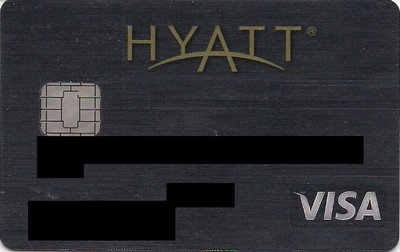
Who issues them?
See Google Docs spreadsheet in Post #1
SFOAMS also has created a list of excellent webpage that shows US EMV cards in a more interactive interface
Another site, which lets you narrow the search for an EMV card by various parameters, is http://www.spotterswiki.com/emv/index.php.
Several credit unions issue some form of Chip-and-PIN credit cards or prepaid cards. Prepaid EMV cards however are not recommended due to junk fees. USAA (currently restricted to members of military) used to offer Chip-and-PIN cards, but as late has backtracked to Chip-and-Signature priority.
Hey that's a cool Google Docs list! I know others that aren't on that list. How can I help by adding them to the list?
My bad for not putting this into the wiki sooner. Right now, the Google Docs is locked out of editing and only in "read-only" view because there were instances in the past where people would just delete the rows not thinking that it affects others viewing the list.
If you promise not to delete any rows and input all the pertinent info (annual fee, rewards, FTF, etc.), I can provide you with edit access. Just shoot me a PM to kebosabi with your gmail address and I'll provide you edit access.
Thanks for helping out!
As of October 2014, no USA-based card issuer offers Chip-and-PIN priority cards except for BMO Harris (Diners Club) and UN Federal Credit Union. Other major USA-based banks such as BofA, Chase, Citi, as well as others issue Chip-and-Signature cards which may work at many automated kiosks. However, bear in mind the word may is used above is a context where there is no absolute certainty of success for certain environments such as automated kiosks due to different natures of offline and online transactions. It is highly recommended to read Post #3 which lists real life FTer examples on how Chip-and-Signature worked and did not work at various transaction environments.
Can I upgrade it right now?
If it's listed on that Google Docs spreadsheet or SFOAMS' Silk page, wouldn't hurt to call/twitter them for a free upgrade. If you get the response you don't like, hang up, try again.
What is the difference between Chip-and-Signature and Chip-and-PIN?
You insert the chipped card into the slot. The physical contact terminal will read the EMV chip and the terminal will automatically read the preferred cardholder verification methods (called CVM) for that card.
Chip-and-Signature means that the terminal will printout a receipt for you to sign. This is the most prevalent authentication for most US issued EMV cards. Chip-and-Signature helps in a way that it will get through to face-to-face merchant transactions where you and the merchant do not speak the same language.
Chip-and-PIN means that the terminal will prompt you to input a PIN for authentication. Some credit union issued credit cards will have this CVM as secondary if Chip-and-Signature cannot be done. Chip-and-PIN is the more prevalent method of authentication used outside the US, especially in transaction environments where no human interaction is needed (i.e. automated gas pumps, toll roads, train kiosks, etc.).
The Google Docs spreadsheet will list which CVM are used in the EMV cards listed. Some cards can only do Chip-and-Signature. Other cards can do both Chip-and-Signature and Chip-and-PIN. And others might have a third option called No CVM (no authentication needed) which is reserved for low value transactions.
One chip can hold a lot more data, therefore it is capable of doing multiple verification methods. That's one of the great things about EMV over the mag-stripe which can hold very little data.
I want to know for sure what my EMV chip does. Is there anyway I can test out my own EMV card to see what the CVM list is?
alexmt has written up a nice step-by-step procedure on Post #3615.
If most of the EMV cards in the US is the Chip-and-Signature type, doesn't that mean it's still useless abroad?
Depends if you see it as glass half empty or glass half full. See Post #3 for further details on how Chip-and-Signature has worked both successfully and unsuccessfully depending on the merchant transaction environment and use your best judgment whether which one is right for you.
Are there any places in the US that are accepting transactions via the EMV chip?
tmiw has created a dedicated Google maps webpage to show where EMV has been proven to work here: http://emvacceptedhere.com/ Per his Post #4240, feel free to add any places with active EMV terminals if you come across one.
As of 2014/05, the EMV terminals in most Walmarts and Sam's Clubs are being turned on. Hence, the best place to try them out would be your local Walmart or Sam's Club. For other merchants, it's slowly being phased in.
I hope people will post them in the Post your receipt of your 1st EMV based transaction in the US thread. cvarming has shown us an EMV transaction receipt from Brooklyn, NY in Post #2380. I myself had my first EMV based (Chip-and-Signature) transaction in two stores in the Los Angeles area, as shown in detail in Post #2705 (courtesy of WhatWhatTech for pointing these two stores out)
I don't want a chip in my card. I heard horror stories all over the media saying hackers can steal my credit card info from a mile away.
There are two types of chips. One is contactless and the other is contact. Cards can be either one or the other, or both.
In the Google Docs spreadsheet, the cards that are capable of contactless payments are listed seperately under the "RFID or NFC contactless chip" column. If it says yes, then that means it has the ability to do contactless payments. If it says no, it doesn't have that feature.
The one that the media has overhyped about hackers "stealing your information wirelessly" was the contactless type like this:
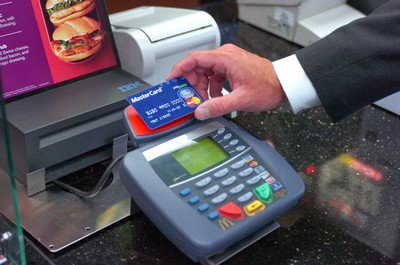
You are worried about this happening, right?
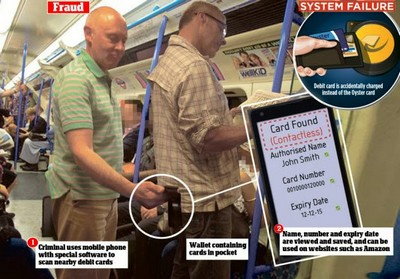
You don't have to worry. EMV is a chip standard that can have both contact and contactless interfaces. With the traditional contact interface, this means you actually have to physically insert the chip into a POS terminal for it to be authorized, like this:
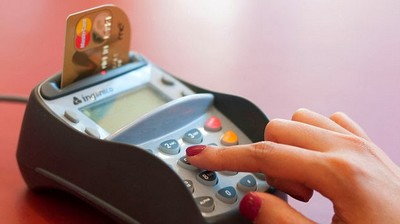
With the contact interface, nothing is wireless. No data is sent out in a stand-alone contact type EMV chip. With the EMV contactless interface, data is sent wirelessly.
Furthermore, contactless chip cards are required to show a symbol (looks like Wi-Fi symbol) somewhere on the card that to denote it's capability as a contactless card. For example, here's an example of a Discover Card with contactless capability (in which Discover calls "Discover ZIP") showing the contactless symbol on the back of the card:
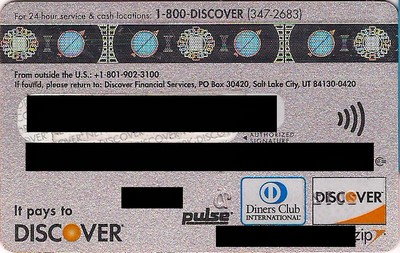
Don't believe everything that the media says. Besides, millions of people all over the world from London to Singapore, uses contactless payments daily in extremely crowded subways and mass transit with nary any problems. There are multiple layers of encrypted securities and keys that are needed to break the code.
Frankly, giving your physical card to a waiter/waitress who takes the card out of your view is much more susceptible to fraud than contactless payments.
Why should I care?
If you are an international traveler, you will want this because majority of the world has or in the process of converting to this payment format.
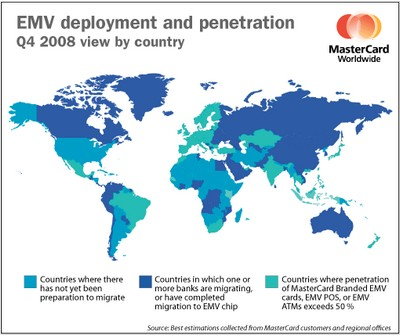
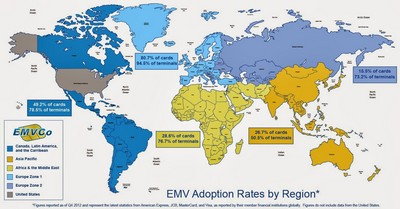
In fact, in 2012, even North Korea moved to the EMV format, leaving the US as one of the countries in the world that hasn't done so.
In addition, VISA, MC, AMEX, and Discover have all agreed to incentivize the USA shifting to EMV payments by 2015 by shifting liability for fraudulent transactions to merchants if they do not have EMV equipment and the cardholder has an EMV card. So if you travel internationally or would like to get one before the others, you might be interested in getting one.
BS! I had no problems using my card in [insert whereever country], [insert whatever point in time]
If you stick to the tourist path where they have lots of visitors from the US, you should have no problems using your mag-stripe only card in hotels and restaurants, at least for now. But as things can change as things go forward.
However, consider that once you start taking the off-beaten path, go to non-touristy places where they are not familiar with mag-stripes, rent a car and use toll roads, fill up gas, or try to buy train tickets you might end up into a trouble of the machine not recognizing your card because it lacks the chip. Furthermore, a lot of toll roads, gas pumps, and automated ticket machines lack any human assistance to help you when you need it the most.
But [insert credit card company] told me all merchants that display their logo must accept them! All I have to do is report them for violating their agreements, right?
There are several factors against this.
1. You can only speak English. The merchant representative, most likely a part-time clerk earning minimum wage, speaks in a different language, let's say French. If you have no French language skills, how are you going to get your point across? Are you going to whip out your cell phone at exorbitant int'l roaming charges and hope the customer service is going to translate it for you on the spot? Or maybe you might actually know French. But how about Swahili, Farsi, Balinese, or the multiple languages in mainland China?
2. Just like US, the rest of the world's businesses uses part-time minimum wage workers as cashiers to cut down on labor costs. Most of their SOP training manuals are written by MBA types to not to do anything they are not familiar with. Do not expect them to understand the intricate details of credit card mumbo jumbo. You don't expect Taco Bell employees to understand the minute details of Discover-JCB-Union Pay agreements, right? Same thing the other way around: be respectful as a guest in their country, prepare in advance in their ways, avoid being an "ugly American" stereotype.
3. You are a guest in their country. You are a minority. If 99.9% of their country's people and other tourists from around the world uses EMV, do you really think they are going to accomodate the 0.1% of American tourists who only have mag-stripes credit cards?
4. Again, you are a guest in their country. How would you, as an American standing in line, react if a Chinese tourist was clogging up the lines at a local Taco Bell because the clerk doesn't understand the Discover-Union Pay agreement and has trouble communicating between Mandarin spoken by the tourist and English spoken by the Taco Bell clerk? Same way the other way around. You do not want to clog up the lines for everyone. The less hassle, the better.
5. VISA and MC make tons of money from merchants in that country. Say SNCF French Rail. It's a billion dollar company in France. Do you think VISA is going to pull the plug of their relationship with SNCF because SNCF refuses to do mag-stripe processing at their unmanned train station kiosk? Of course not. Be realistic.
6. And lastly, if you're up against an unstaffed toll kiosk, gas pump or train ticket machine, are you going to yell curses at the machine?
But I want my credit card to be able to be used in the US too!
No worries. They have not gotten rid of the mag-stripe on the back of the card for backward compatibility reasons, just like we still have embossed numbers on our cards for backwards compatibility to using those old carbon copy imprinters.
[insert own Hyatt card image front and back together with red arrows pointing to all the backward compatibility features]
You use the chip on the front of the card abroad (for now), and the mag-stripe just like any other card for the US. Basically, you're increasing your credit card's acceptance rate by getting a card that both via the chip and the mag-stripe. You're getting a better deal for free.
And when 2015 comes along and US switches to EMV, you'll be way ahead of everyone else too!
So why did the rest of the world and the US moved/moving toward EMV?
Primarily, due to fraud concerns. You see, the mag-stripe has been with us since the 1950s. It may have been the most high tech thing back in the day, but with the technology that is available today, any shmo can pick up a $100 USB magnetic card skimming device off of eBay and get your credit card info.
And unlike skimming off contactless cards which actually need the person to have l33t programming skills, skimming off a magnetic stripe has become so ubiquitous that nary a day goes about skimming fraud going on somewhere in America, from gas pumps, Michael's stores (2011), Target breaches (2013), restaurant waiters/waitresses, to even McDonald's drive thrus.
https://www.google.com/search?q=skimming+fraud
These type of fraud used to be prevalent in Europe. But once they started switching over to EMV starting over 2 decades ago, this type of fraud went elsewhere. It went over to Asia, Canada and Mexico, Latin America, etc. etc. until they too began implementing EMV to combat skimming fraud. The US is practically the only country left that hasn't done so, therefore all the fraud that used to take place elsewhere is now happening here.
But EMV is old and it's not fool proof. Shouldn't we just skip over it and do something new instead?
Yes, EMV is old. It was developed in the 1990s and its smart card payment predecessor was first introduced in France. But as of today, it has become the defacto global standard of payments.
But then, what else is there? There is no other de facto global standard of payments alternative. For example, if we decide to skip over it and do something new, hypothetically like DNA matching technology, it still means US int'l travelers will continue to have problems abroad with useless plastic acceptance because no other country is using this DNA matching technology except the US.
Besides, nothing is fool proof. You can say that the bank vault isn't fool proof because you can crack it open if enough C4 is used. But your average low-life scumbag isn't likely to get military grade C4 easily either. But the bank vault does make it harder to get the bank's money over say a petty cash box. That's the point here. EMV is akin to a security tight bank vault, the old mag-stripe is akin to a petty cash box lying around inside the drawer.
I'm a business owner and I don't think EMV is going to take off. I'm not going to spend extra hundreds of dollars to upgrade my credit card machine. Convince me other wise why I should.
I can understand the added extra cost to your business once this switchover takes place. But before even saying that, look at your existing POS terminal. Does it have a slot somewhere to insert a card?
Most likely, if you had replaced your POS terminal within the past five years, you already have an EMV capable terminal. EMV is basically just not turned on yet from the processor and acquirer side.
If you have an EMV capable terminal, then a best bet would be to contact your acquirer to have the EMV feature turned on. You did your end of the deal already by having an EMV capable terminal, it is now the acquirers' responsibility to turn it on in accordance to the EMV switchover mandate.
And if you don't, you are going to replace your POS terminal anyway from common wear and tear. It isn't a hard switch-over. You can continue to use your POS terminal until it dies out because EMV cardholders will still have the mag-stripe on the back. And by the time your non-EMV capable POS terminal is up for replacement the market will be full with these newer POS terminals that can accept the mag-stripe, EMV, as well as contactless payments.
In addition, you may also want to check with your acquirer or processor about EMV capable terminals. Some of them are willing to replace your terminal for free in preparation for the US EMV switchover. Call and ask for details.
But what's in it for me? I'm the one that has to pay for the upgrade.
All the major card networks have given incentives for merchants for the upcoming EMV switchover.
If 75% or more of your credit card transactions are done on an EMV contact and contactless terminal, they are going to waive your annual PCI-DSS fees, which usually costs you around $5.00-$19.95/month per terminal. The overall long term cost savings of those compliance fees will be larger than the cost of an one time upgrade for the terminal.
The downside is that once EMV switchover happens and if you do not have a POS terminal that is able to accept EMV, the fraud liability shifts over to the merchant.
I own several fast food franchises. If I upgrade my POS terminals at all of my restaurants, it's going to cost me thousands, if not millions. I don't think anyone is going to use a fake credit card to buy $5 burgers. And if they do, wouldn't it be cheaper for me to eat the fraud cost?
Remember also that fraud isn't just committed by dishonest customers using fraudulent cards. Fraud can also happen with dishonest employees skimming off credit card data from the mag-stripe as in the case of a teenage McDonald's drive thru employee skimming off $13,000 of customers' credit cards in Olympia, WA. Consider the public relations fall out that your business may have if this happens (i.e. the big Target breach of 2013, where someone used a mag stripe card to load malware INTO Target's system). Is it worth risking to take such a huge PR disaster?
#3796
Quote:
The old Blue Cash has EMV too. I think at this point there are few AmEx products without EMV.Originally Posted by xSTRIKEx6864
American Express Blue Cash Everyday should be added to the list (Google spreadsheet) as having EMV. 2.7% foreign transaction fee, though.
#3797
Quote:
Culture does have a lot to do with it. Originally Posted by reclusive46
Interesting. It shows you the cultural differences though. The biggest note you ever see day to day in the UK is £20. There are some £50 notes but I've only ever seen one once (I got one from ATM about 4 years ago) and I probably wouldn't accept it if someone tried to pay with one as I don't really know what they look like or its security features (they redesigned it last year) + No one really pays cash for anything over £20 (£10 for a lot of people).
For example, though a lot has changed since I was a kid, many of Japan still remains a cash only society, especially if you wander outside of the major cities.
Even in the city of Narita, at the Nakasendo that leads down to the Shinshoji (Narita-san) Buddhist Temple, though they see many foreign tourists there due to its proximity to NRT, many shops do not accept credit cards. You don't have cash and only have a credit card, they literally do not want your business. Some businesses are even fed up with foreigners asking if they accept credit cards that they even have signs at their front door that say "CASH ONLY, NO CREDIT CARD" in multiple languages.
And for the most part, they are fine with that because many Japanese still prefer to use cash for everything.
Many of this also has to do with the fact that historically, processors and acquirers of the Japanese credit card industry were like an oligopoly (about three card acquirers that controlled 95% of the market). It wasn't until the 1990s that the government eased the regulations to allow for more competition. But the mindset that "making our business to accept credit cards aren't worth the cost" is still the way of thinking in many mom-and-pop merchants in Japan.
Over here in the US, Canada or Europe, anything over a "twenty" is considered too big and not worth being carried around on a daily basis. In Japan, most Japanese just carry the 1000, 5000, and 10000 yen bills, along with coins many even stacks of them, inside their wallet. Oddly, even though Japan issue s a 2000 yen bill, it remains very unpopular which is strange as it's value is like a "twenty" which is a popular bill in the US, Canada, and Europe.
Don't get me wrong, I love Japan. I go there almost every year, maybe two or three times a year. But everytime I go to Japan, I have to carry around cash, or know where the nearest internationally accepted ATMs are, as Japan is still a cash oriented society. And oddly this co-exists with being one of the most high tech nation in the world when it comes to everything, including using contactless cards for mass transit.
Strange, huh?

#3798
othermike27 , Mar 31, 2014 7:49 am
Quote:
<snip>
Makes me wonder what I'll be in for next year in Paris.
Well, my limited experience says you'll wind up with some €100 and €50 notes from whatever ATM you hit, and that many merchants will look unhappy if you wave a €50 or even a €20 at them. As others suggested, most seem to prefer a payment that requires the least amount of change from them. I try to arrange my purchases with this in mind where possible, and to go out of my way to break larger bills at hotel desks or other places on the tourist main stem that are more accommodating.Originally Posted by Dragonbelle
From what I've read, rivaling chip-and-PIN as a travel challenge is having exact change in cash. As majuki experienced in Germany, if you request, say, 100 euros from an ATM, you're likely as not to get a single 100-euro note. Which nobody wants to change or accept as payment. <snip>
Makes me wonder what I'll be in for next year in Paris.
A good tip (from Rick Steves' guidebooks) is to draw an "odd" amount, forcing the ATM to give you at least a few small bills. For example, my bank lets me draw a maximum of $500 per day per card. Also, most ATMs seem to want to dispense amounts that are multiples of €20. So, if the exchange rate is €1 = $1.35, I can draw 500/1.35 ~ €370 at a time. Round down to nearest 20-multiple (or up, depending on the bank's leniency with the exchange rate), and ask the ATM for €360. You'll at least get €60 in smaller notes to work with until you get back to your hotel.
Or, since you are in Paris, just eat at nice restaurants, which should help you work down any surplus of large notes you might have. I recommend the Cafe de la Paix, right across from Opera Garnier. You can dine sumptuously, imagine yourself hobnobbing with the famous great thinkers and literary persons who used to frequent the cafe, and keep an eye out for the phantom across the street. And you may be sure that your stack of €100's will soon be reduced to a more manageable size, n'est-ce pas?

Quote:
http://www.dw.de/tough-times-for-the...ote/a-16865110
I had no idea there was a 200 Euro note.
Strange article. Are they really criminalize having cash in Germany?Originally Posted by LoneTree
Interesting article on that subject:http://www.dw.de/tough-times-for-the...ote/a-16865110
I had no idea there was a 200 Euro note.
Is this a true statement?
Quote:
Because of money laundering laws, citizens must prove a legal origin for large amounts of money.
What is considered "large" amount? Because of money laundering laws, citizens must prove a legal origin for large amounts of money.
Oh, and this is so stupid:
Quote:
Taking the large note out of circulation should therefore not be publicized, said Hickel. The longer elimination of the 500-euro note is discussed, the greater the opportunities for criminals to re-launder the money.
Criminals would know about this before some officials will do...Taking the large note out of circulation should therefore not be publicized, said Hickel. The longer elimination of the 500-euro note is discussed, the greater the opportunities for criminals to re-launder the money.
#3800
Why would anyone on this thread be paying such a large restaurant bill in cash?  I don't go out of my way to accommodate fussy cashiers or waitresses who balk at taking €50 or €100. I got burned once by someone seeing I had smaller notes. Now I make it clear it's all I have except credit cards, so either play ball or don't get paid. I am not unreasonable about it - I wouldn't do this to a street vendor - but when you're a full service restaurant you have enough change for the weekend. Keep in mind this is after I was turned away at the hotel reception because they needed to make change over the weekend. Larger chain hotels in big cities will usually change notes, but if you're in a smaller city or non-Marriott, Starwood, Hilton, Holiday Inn type they're more reluctant.
I don't go out of my way to accommodate fussy cashiers or waitresses who balk at taking €50 or €100. I got burned once by someone seeing I had smaller notes. Now I make it clear it's all I have except credit cards, so either play ball or don't get paid. I am not unreasonable about it - I wouldn't do this to a street vendor - but when you're a full service restaurant you have enough change for the weekend. Keep in mind this is after I was turned away at the hotel reception because they needed to make change over the weekend. Larger chain hotels in big cities will usually change notes, but if you're in a smaller city or non-Marriott, Starwood, Hilton, Holiday Inn type they're more reluctant.
 I don't go out of my way to accommodate fussy cashiers or waitresses who balk at taking €50 or €100. I got burned once by someone seeing I had smaller notes. Now I make it clear it's all I have except credit cards, so either play ball or don't get paid. I am not unreasonable about it - I wouldn't do this to a street vendor - but when you're a full service restaurant you have enough change for the weekend. Keep in mind this is after I was turned away at the hotel reception because they needed to make change over the weekend. Larger chain hotels in big cities will usually change notes, but if you're in a smaller city or non-Marriott, Starwood, Hilton, Holiday Inn type they're more reluctant.
I don't go out of my way to accommodate fussy cashiers or waitresses who balk at taking €50 or €100. I got burned once by someone seeing I had smaller notes. Now I make it clear it's all I have except credit cards, so either play ball or don't get paid. I am not unreasonable about it - I wouldn't do this to a street vendor - but when you're a full service restaurant you have enough change for the weekend. Keep in mind this is after I was turned away at the hotel reception because they needed to make change over the weekend. Larger chain hotels in big cities will usually change notes, but if you're in a smaller city or non-Marriott, Starwood, Hilton, Holiday Inn type they're more reluctant.Quote:
Can you elaborate on being burned? Did someone see your cash and take it from you or assume it was theirs instead of accepting your EMV card? What did they do when you told them it was to pay a street vendor or pay a friend back (i.e. folks who do not accept your EMV card)?Originally Posted by Majuki
I got burned once by someone seeing I had smaller notes. Now I make it clear it's all I have except credit cards, so either play ball or don't get paid.
Quote:
What banks offer these readers? Are they a proprietary solution or standards based?Originally Posted by reclusive46
Oh sorry for not being clear. I wasn't referring to card readers that plug into a computer. They are seperate and battery powered. You insert your card, enter your pin and you get a 60 second code to use on you internet banking or 3d secure transaction.
#3803
Quote:
I don't know if you're subtly trying to imply that these posts are going off topic, but it would be best to come out and say that directly if that's the case...Originally Posted by emvchip
Can you elaborate on being burned? Did someone see your cash and take it from you or assume it was theirs instead of accepting your EMV card? What did they do when you told them it was to pay a street vendor or pay a friend back (i.e. folks who do not accept your EMV card)?
By being burned I mean being compelled to spend smaller notes because the cashier saw them when I tried to pay with €50 (or in one case €20). There were language barriers here, but in each situation enough was understood that the cashier/waitress wanted to make the least amount of change possible. As this was in Germany, none of these places accepted cards as payment. I have never had my chip-and-signature card refused by a merchant that takes cards as a form of payment, only at unattended kiosks that use offline PIN verification.
#3804
Quote:
I don't know how the UK works, but Japan operates similarly for contactless cards, albeit for transit cards and reloadable prepaid cards.Originally Posted by emvchip
What banks offer these readers? Are they a proprietary solution or standards based?
Any person can buy an USB NFC card reader at any electronics store in Japan, like this, usually for around 3000 JPY:
http://www.sony.co.jp/Products/felic...l?j-short=pcrw
Pretty much all of contactless in Japan is standardized to the Felica system and since NFC supports Felica, it's a defacto standard USB contactless card reader that any contactless card in Japan can be used for it.
When one needs to access private information from their home computer, (i.e. transit cards like Suica or PASMO, contactless prepaid cards like WAON or Edy, etc.), all one needs to do is hook up this device to their computer, and place their contactless cards onto it to access vital personal information via the internet. There, they can view their transactions and make reloads to the card at the comfort of their own home. They are primarily used for stuff like transit cards and prepaid cards so that it proves that you have the card in hand right now as well.
It's not like you need it, but for those who don't want to go back and forth to the nearest train station or to a specified reload kiosk, it provides them with an option to buy this device at their own expense so that they can do it securely at the comfort of their own home.
In the context of interest that some people here are buying their own contact readers to see the CVM list of their EMV cards (I actually ended up buying the SCM 3500 model over shopping at Fry's, hoping to get it today or tomorrow), I think it's an option that banks in the US can look into as an extra layer of security: you can't log into your account info unless you stick your own card into your own computer via a USB (EMV or NFC contactless) card reader.
Any hacker can steal passwords easily but they won't be able to access it if they don't have the physical card. A burglar can steal the card easily, but they won't be able to access it if they don't have the login ID and password. Why not combine the best of both worlds? It certainly does ante up the level of security. Is it a panacea and 100% solution, no nothing is. But it raises the bar a lot that one would need both the physical card AND the login ID/password to gain entry to personal info.
The US military already does this with their CAC when they need to access confidential e-mail over the internet. CAC is basically an EMV card that provides the same level of security: need both physical card in hand and the login ID/password to gain entry to key info. It is standardized across the US military. And card readers are readily available for pickup as some here have started buying.
That being said, I don't see why not the banking system could offer the same level of optional security. Note the italics in optional.
#3805
Quote:
A good tip (from Rick Steves' guidebooks) is to draw an "odd" amount, forcing the ATM to give you at least a few small bills. For example, my bank lets me draw a maximum of $500 per day per card. Also, most ATMs seem to want to dispense amounts that are multiples of €20. So, if the exchange rate is €1 = $1.35, I can draw 500/1.35 ~ €370 at a time. Round down to nearest 20-multiple (or up, depending on the bank's leniency with the exchange rate), and ask the ATM for €360. You'll at least get €60 in smaller notes to work with until you get back to your hotel.
Or, since you are in Paris, just eat at nice restaurants, which should help you work down any surplus of large notes you might have. I recommend the Cafe de la Paix, right across from Opera Garnier. You can dine sumptuously, imagine yourself hobnobbing with the famous great thinkers and literary persons who used to frequent the cafe, and keep an eye out for the phantom across the street. And you may be sure that your stack of €100's will soon be reduced to a more manageable size, n'est-ce pas?
Or, as long as you're not charged per ATM withdrawal, withdraw €20, 10 times! Originally Posted by othermike27
Well, my limited experience says you'll wind up with some €100 and €50 notes from whatever ATM you hit, and that many merchants will look unhappy if you wave a €50 or even a €20 at them. As others suggested, most seem to prefer a payment that requires the least amount of change from them. I try to arrange my purchases with this in mind where possible, and to go out of my way to break larger bills at hotel desks or other places on the tourist main stem that are more accommodating.A good tip (from Rick Steves' guidebooks) is to draw an "odd" amount, forcing the ATM to give you at least a few small bills. For example, my bank lets me draw a maximum of $500 per day per card. Also, most ATMs seem to want to dispense amounts that are multiples of €20. So, if the exchange rate is €1 = $1.35, I can draw 500/1.35 ~ €370 at a time. Round down to nearest 20-multiple (or up, depending on the bank's leniency with the exchange rate), and ask the ATM for €360. You'll at least get €60 in smaller notes to work with until you get back to your hotel.
Or, since you are in Paris, just eat at nice restaurants, which should help you work down any surplus of large notes you might have. I recommend the Cafe de la Paix, right across from Opera Garnier. You can dine sumptuously, imagine yourself hobnobbing with the famous great thinkers and literary persons who used to frequent the cafe, and keep an eye out for the phantom across the street. And you may be sure that your stack of €100's will soon be reduced to a more manageable size, n'est-ce pas?


Quote:
Is this a true statement?
What is considered "large" amount?
Oh, and this is so stupid:
Criminals would know about this before some officials will do...
That's the law in Israel as well. Money changers are legally required to ask people why they are changing large sums of cash.Originally Posted by dgcom
Strange article. Are they really criminalize having cash in Germany?Is this a true statement?
What is considered "large" amount?
Oh, and this is so stupid:
Criminals would know about this before some officials will do...
#3806
As promised, here are the CVMs for the EMV cards that I have (sorry for the small images):
Andrews FCU GlobeTrek Rewards VISA

CitiAAdvantage Platinum VISA Signature

CitiAAdvantage Platinum World Elite Mastercard

Chase Hyatt VISA Signature

Andrews FCU GlobeTrek Rewards VISA

CitiAAdvantage Platinum VISA Signature

CitiAAdvantage Platinum World Elite Mastercard

Chase Hyatt VISA Signature

#3807
It seems like Andrews FCU is the one that has it all: Chip-and-Signature, No CVM, and offline Chip-and-PIN, in that order.
It was interesting to see that for CitiAAdvantage, there's a difference between the VISA (Chip-and-Signature, then No CVM) and the MC (Chip-and-Signature, online Chip-and-PIN, then No CVM).
It was interesting to see that for CitiAAdvantage, there's a difference between the VISA (Chip-and-Signature, then No CVM) and the MC (Chip-and-Signature, online Chip-and-PIN, then No CVM).
#3808
Hawaiian717 , Mar 31, 2014 8:51 pm
Hawaii State FCU will begin issuing EMV cards tomorrow:
http://www.bizjournals.com/pacific/n...ew-credit.html
It's unclear what "select employment groups" other than Hawaii state, Maui county, and Honolulu city and county employees and relatives can join, but for those who are eligible, it looks like it's not a too terrible card, with 1% cash back, no annual fee, and no FTF:
https://www.hsfcu.com/loans-a-lines-...dit-cards.html
It doesn't say but since it's a Visa I'm guessing its C&S.
http://www.bizjournals.com/pacific/n...ew-credit.html
It's unclear what "select employment groups" other than Hawaii state, Maui county, and Honolulu city and county employees and relatives can join, but for those who are eligible, it looks like it's not a too terrible card, with 1% cash back, no annual fee, and no FTF:
https://www.hsfcu.com/loans-a-lines-...dit-cards.html
It doesn't say but since it's a Visa I'm guessing its C&S.
#3809
Quote:
http://www.bizjournals.com/pacific/n...ew-credit.html
It's unclear what "select employment groups" other than Hawaii state, Maui county, and Honolulu city and county employees and relatives can join, but for those who are eligible, it looks like it's not a too terrible card, with 1% cash back, no annual fee, and no FTF:
https://www.hsfcu.com/loans-a-lines-...dit-cards.html
It doesn't say but since it's a Visa I'm guessing its C&S.
If they contract out with PSCU there's a good chance it'll have a PIN (but would probably be signature priority).Originally Posted by Hawaiian717
Hawaii State FCU will begin issuing EMV cards tomorrow:http://www.bizjournals.com/pacific/n...ew-credit.html
It's unclear what "select employment groups" other than Hawaii state, Maui county, and Honolulu city and county employees and relatives can join, but for those who are eligible, it looks like it's not a too terrible card, with 1% cash back, no annual fee, and no FTF:
https://www.hsfcu.com/loans-a-lines-...dit-cards.html
It doesn't say but since it's a Visa I'm guessing its C&S.
#3810
Updated the Google Docs spreadsheet for the EMV cards that I have based on the CVM list that I found out for my own cards.
I really love the SCM-3500 reader. Small compact, and does the job, and only costed me less than $14.00! Thanks to the person who recommended me this! ^
I really love the SCM-3500 reader. Small compact, and does the job, and only costed me less than $14.00! Thanks to the person who recommended me this! ^


















